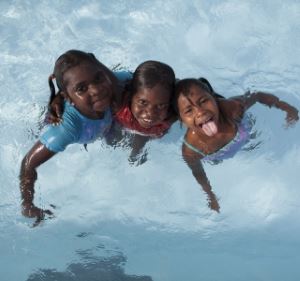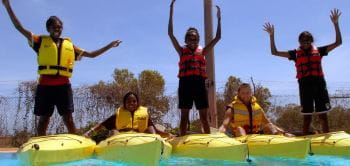Bidyadanga Pool a great place for local community
Bidyadanga is the largest remote Aboriginal community in WA with about 750 residents. Bernie Egan has been a Remote Pool Manager with Royal Life Saving Society WA for the past 9 years and currently manages the Bidyadanga pool on the remote Kimberley coast.
For Bernie, the future of the pool relies on having locals take more of a role in running the pool. This is already beginning at Bidyadanga with an indigenous woman called Rita becoming a great asset there.
“Rita helped out with a survey at the pool, greeting people at the gate and pretty much taking roll on attendance. We’re really looking at her becoming our pivotal point in promoting the Watch Around Water program here at the swimming pool, and increasing the supervision of the under-fives by the parents or guardians. With an indigenous person administering that program we're hoping it's going to be better received by the people using the swimming pool and hopefully increase the enjoyment and safety of our pool users as well."

Indigenous groups have been identified as a demographic at a high-risk of drowning and non-fatal drowning in Australia. Aboriginal children drown at a rate two and a half times that of non-Aboriginal children.
The Remote Aboriginal Swimming Pools Project (RASP) is managed by Royal Life Saving WA and is funded primarily through the Department of Communities with additional contribution made through BHP and the Telethon Kids Institute. It focuses on providing the remote communities of Burringurrah, Jigalong, Yandeyarra, Bidyadanga, Warmun and Fitzroy Crossing with recreational and educational swimming programs, to encourage safe aquatic participation.
Bernie says the pool is definitely a focal point for the locals; “I think a lot of the kids don’t have anywhere to go after school, so it becomes a bit of a hub for the local community to have somewhere to go that’s safe and clean. I like to refer to the pool as a ‘G’ rated environment so there’s no swearing, no fighting; for the kids it’s just a really good place to hang out.”

The pool provides significant health and social benefits for the community, and Bernie also hopes to see it become a place where locals kids can train for their future! “We’ve had several of the high school students ask about the possibility of work experience at the swimming pool, so the plan is to get one or two kids to come over and take part in work experience each season. Who knows where that may lead? There's the possibility of them furthering on and becoming a swim teacher or a lifeguard."
Royal Life Saving pool managers live in each community for nine months of the year, maintaining the pools and delivering community programs which include swimming lessons, swimming and lifesaving carnivals, birthday parties, after-school and holiday swimming, lap swimming, lifesaving training and other activities at the request of the community.
Our managers are doing fantastic work with the remote pools, forging partnerships with local community members and fostering relationships in order to make the local pool experience the best it can be, while aiming for a future where the remote pools can be managed and self-run by the local indigenous community.